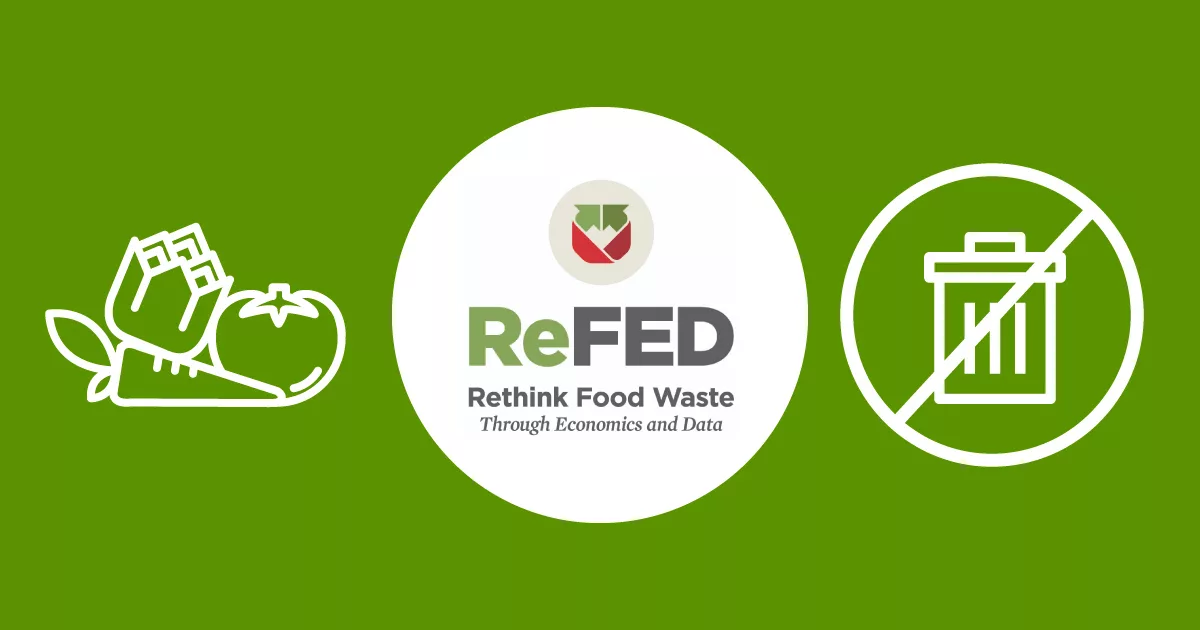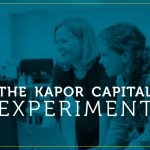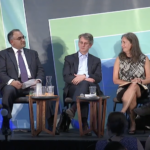By Mandy Gardner
Reducing food waste is a key strategy for reducing greenhouse gas emissions and mitigating climate change. Project Drawdown, a comprehensive plan to reverse global warming, ranked food waste reduction as third on its list of 100 solutions to address climate change. To learn about the connection between these challenges (and potential solutions) we talked to members of the leadership team at ReFED, the nonprofit focused on accelerating solutions to food waste that created The Roadmap to Reduce U.S. Food Waste By 20 percent.
Chris Cochran, the Executive Director of ReFED, and Alexandria Coari, the organization’s Capital and Innovation Director, sat down with us to discuss the intersection of food waste and climate change, and opportunities for the SOCAP community to help become part of the solution.
SOCAP: How does food waste contribute to climate change and what is the scope of the challenge?
Chris Cochran: In the US we waste up to 40% of food–that’s 63 million tons–every year. Most people recognize that this is a big economic cost, which we’ve valued at $218B annually. Fewer people are aware that food waste is also a leading source of methane emissions, which is a short-lived climate pollutant, also called a super pollutant, that is many times more powerful than carbon dioxide. Though they remain in the atmosphere less time than greenhouse gas pollutants such as carbon dioxide (CO2), short-lived climate pollutants are increasingly thought by climate researchers to have a much more dangerous impact on global warming. Food waste contributes 4.5% of all US greenhouse gas emissions (in the form of methane).
SOCAP: What innovative solutions is ReFED using to combat climate change through reducing food waste?
Alexandria Coari: There are a variety of solutions to food waste that currently exist. And because of the connection between food waste and greenhouse gas emissions, by reducing that food waste we have the potential to cut greenhouse gas emissions as well. ReFED works with food businesses, innovators, philanthropic foundations, investors, and policy makers to implement some of these solutions.
According to our analysis, which we highlighted in our Roadmap to Reduce U.S. Food Waste, we’ve identified 27 solutions using existing technology that we could implement today to reduce food waste by 20% in the US and reduce greenhouse gas emissions by 18 million tons of CO2 equivalent per year. According to our calculations, four of these solutions present the greatest opportunities to cut greenhouse gas emissions today:
- Centralized composting, which could reduce about 2.6 million tons of CO2 equivalent per year.
- Consumer education campaigns, which could reduce 2.3 million tons of CO2 equivalent per year.
- Waste tracking and analytics, which could reduce 2.3 million tons of CO2 equivalent per year.
- Standardized date labelling, which could reduce about 1.6 million tons of CO2 equivalent per year.
Alexandria Coari: Beyond existing technologies, we are also seeing huge growth in the number of new solutions that are coming online. We are tracking that growth and innovation through our innovator database. We currently are tracking over 400 food waste solutions and innovators there.
SOCAP: Can you highlight a few of these new innovations?
Alexandria Coari: There are interesting new solutions being developed across the food recovery hierarchy of prevention, recovery, and recycling. For an example on the prevention side, look at LeanPath. They recognize that by consistently tracking wasted food, organizations can better measure and analyze it and make the changes that they need to prevent it from occurring. They have developed hardware and software solutions that they provide to culinary institutions, such as foodservice and restaurants, to do exactly that.
On the recovery side, there is an innovator called Replate, a nonprofit tech startup based in Berkeley, that instantly matches and delivers donated prepared food from businesses to communities and agencies in need. They are currently working with over 400 businesses and nonprofit recipients.
An example from the recycling side is WISErg, based in Washington State. They place smart dumpsters at grocery stores that allow retailers to track their waste. So it is similar to LeanPath, but targeted to grocery stores as well. And then their system, because they are capturing the food – they are able to turn that into liquid organic fertilizer rich farmers can use to improve their soil health.
SOCAP: As you are tracking these new solutions and innovators, how are you measuring impact and what sort of impacts are you already seeing?
Chris Cochran: We are tracking impact across the space, starting with food waste generation from food businesses. I would say that one of the findings we recently had was that food waste represents an $18B annual cost to the grocery retail sector in the US. Which in relative terms is double the profits from food sales. There is great demand for innovative solutions. I would say our first impact metric is looking at food waste generation of food businesses.
We then are monitoring the landscape and charting the growth of 400 innovators (based in the US and abroad) in our innovation database.
The third area we track is investment in the food waste sector; we are in the process of updating our philanthropic investment tracker, which we first released two years ago. By summer we will have a new report on all of the food waste philanthropic investment that is happening. In addition, we’ve been tracking investment in food waste startups and food waste innovators on an ongoing basis.
SOCAP: Where is investment capital most needed to shift the food system towards reducing waste and designing for a circular economy?
Alexandria Coari: We’ve identified an $18B need for new financing to achieve a 20% reduction in food waste over the next decade. We track both philanthropic funding coming into the space and the private capital funding. On the philanthropic side, the need that we’ve identified is about $300M annually in both philanthropic and impact investment. However, based on our last baseline analysis, we estimate that between 2012 to 2014 only about $5M per year in philanthropic funding was delivered which demonstrates a huge funding gap from this form of capital. This summer we will be releasing an updated philanthropic investment report that will provide more specifics on the progress made to date, however a gap (and therefore opportunity) still remains.
On the private capital side, the need we’ve identified is about $660M in annual funding from venture capital, private equity, private finance, and corporate finance. Interestingly enough, we are seeing that the number of new startup organizations and innovations coming to market continues to explode and we don’t expect that to slow down anytime soon. And we’ve been noting what seems like a tipping point in terms of organizations starting to reach scale, whether that looks like they are expanding to multiple locations across the country, hiring new employees, or growing their business revenue. In 2016 there was about $93M in venture capital and private equity funding for about 20 waste tech startups. A greater percentage of that funding was going towards the recycling end of the spectrum, which make sense because they are typically pretty capital intense infrastructure developments. For examples of ventures in the waste tech space that raised investment funding last year you can look at WISErg who in 2017 raised $20M for a total of $68M to date. Another example is Imperfect Produce, a venture based in San Francisco that sells ugly produce to consumers in weekly CSAs. Last year they raised $9M for a total of about $11M to date.
So the key takeaway, in our minds on the capital front, is that the food waste innovation sector is really exciting – rapidly changing and growing. But there is still a lot of experimentation happening. So it is going to be important for funders moving forward over the next few years to support pilots, innovation and general capacity building for nonprofits as well as for-profits that are doing great work in the space.
SOCAP: What are the greatest areas of opportunity presented by this challenge for innovative entrepreneurs?
Alexandria Coari: Two things I would mention specifically are, one, the opportunity for prevention solution funding. Prevention solutions can yield the greatest value in terms of economic value per ton of food waste diverted. However according to our estimates less than 5% of funding actually goes towards prevention solutions, despite this area’s ability to drive really high social, economic, and environmental benefits. And, on average, their greenhouse gas reductions are about two to ten times larger than recycling solutions since they reduce the agricultural inputs and transportation that happens upstream.
I would also mention the opportunity and role that policy can play to speed up innovation and bring new solutions to the space. One example is the Massachusetts organic landfill ban. This prohibits food from being thrown into landfills in the state thereby forcing businesses to either prevent, recover, or recycle their food waste. Progressive policies like this may explain why, as we’re seeing in our innovator database, about 36% of innovation in the state of Massachusetts is happening around composting and renewable energy from organics versus only about 23% nationally. That suggests that these progressive policies could have a real impact in terms of reducing food waste and greenhouse gas emissions.
Chris Cochran: I would also add that this is big business. Food businesses have been experiencing stagnant top-line sales growth and they are looking internally at how to cut costs. Food waste emerged as a key CFO-level strategy for reducing costs. So there is a market opportunity being created for these innovations because of the changing grocery retail, restaurant, and food service environment. We estimate that the cost to those businesses is valued at $57B today. Wal-Mart made an announcement in March of this year about a new intelligent food system called Eden they are using that is supposed to save them $2B over the next five years. This is big business. The innovations that we are talking about have a market and it is a rapidly growing market.
SOCAP: What is your call to action to the SOCAP Community?
Chris Cochran: Explore how food waste can be used as a strategy to achieve your mission. Food waste reduction is not an end in itself–it is a strategy, and one that I think funders should take a closer look at.
Second, look into ReFED. We are thinking about this all day, every day and have great people and resources available, including Alex’s leadership of our funders initiative and also our online information on ReFED.com. In addition to The Roadmap to Reduce U.S. Food Waste, we have a number of new action guides that have just come out including our Foundation Action Guide. Finally, attend the US Food Waste Summit that we are hosting this summer on Harvard’s campus. It will be the leading event for 2018 for food waste leaders from the business, investor, policy, and innovation communities to come together around this topic.
 Chris Cochran is the Executive Director of ReFED. Previously, Chris was the Senior Manager of Sustainability at Walmart where he developed a farm to consumer view of food waste while leading sustainability for Walmart’s global produce business. Chris’s experience with tackling food waste from multiple points in the value chain helps ReFED bring together new collaborators on food system challenges.
Chris Cochran is the Executive Director of ReFED. Previously, Chris was the Senior Manager of Sustainability at Walmart where he developed a farm to consumer view of food waste while leading sustainability for Walmart’s global produce business. Chris’s experience with tackling food waste from multiple points in the value chain helps ReFED bring together new collaborators on food system challenges.
 Alexandria Coari serves as ReFED’s Capital and Innovation Director. She brings 10 years of business development, impact investing, and strategy consulting experience with startups, for-profits and nonprofits in the U.S. and Latin America, including time at Agora Partnerships and Fair Trade USA. She is passionate about helping mission-driven companies grow their impact and believes in the power of market-based approaches to solving today’s biggest challenges.
Alexandria Coari serves as ReFED’s Capital and Innovation Director. She brings 10 years of business development, impact investing, and strategy consulting experience with startups, for-profits and nonprofits in the U.S. and Latin America, including time at Agora Partnerships and Fair Trade USA. She is passionate about helping mission-driven companies grow their impact and believes in the power of market-based approaches to solving today’s biggest challenges.





